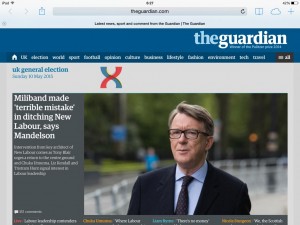The Guardian is widely considered a left-wing newspaper:
When the election results first became clear, I pointed out that Thatcher’s real victory was not the policies she had put in place or the changes she had made to the UK, it was that the main opposition party had become neo-liberal as well. This meant that her project would continue, no matter who was elected.
Neo-liberalism is successful because it is the only alternative to itself; there is no other option but neo-liberalism. Of course, you can choose between flavors of neo-liberalism (“How fast should we do this project?”, “How cruel should we be to poor people?”, and “How quickly should we divest the public sector and the population of their income and wealth and give it to the rich?”), but all you’re choosing between is how quickly the neo-liberal project (which includes austerity as its logical late form) will proceed.
Other than the process of how actual material circumstances turn into ideology, which then turns into action, nothing is as important as controlling the acceptable matrix of options.
What the Guardian is doing here is attempting to make sure that in response to its loss, Labor becomes even more right-wing, even more dedicated to neo-liberalism. One can equally and easily make the case that Labor was not left wing enough, and that’s why Scotland went SNP (which was more left-wing than Labor); and that’s why left-wing voters didn’t turn out to vote. But that’s not what The Guardian has chosen to do. The Guardian chose to put, on their front page, the assertion that Labor lost because it was not right-wing enough.
Note that most people read only headlines and that the most important headline is the one on the front page. Yes, The Guardian has published articles suggesting that labor wasn’t right-wing, but most people will never read those articles. In “journalism,” as in real estate, the three most important things are location, location, and location.
Do not think that The Guardian’s editors do not know this, or do not understand the consequences of what they are doing. This is their business, and they are good at their business. The conclusion which should be drawn, absent strong evidence otherwise, is that if they are taking an action likely to push Labor right, they know they are doing it, and they want to do it or they wouldn’t do it. (Since, again, writing the opposite article would be easy enough.)
Now note that this system is breaking down on the peripheries. The Scots voted for the SNP, which was very left-wing by current standards. Albertans recently voted for the Canadian New Democratic Party, the most left-wing party in Canada, which the establishment never thought stood a chance of winning, and which ran on (among other things) increasing the corporate tax rate.
These are glimmers: sparks and little more. But they and the rise of other third parties, including ones I would argue are failing (like Syriza), indicate that the establishment is losing control of the democratic process; their framing is not sufficient.
Given an opportunity to vote for what appears to be a real alternative to the status quo (as opposed to a fake alternative like Labor under Millibrand), many people are starting to do so. This isn’t limited to the left-wing, mind you. UKIP, the anti-immigrant, essentially-fascist party in the UK got over 10 percent of the vote.
In Scotland’s independence referendum, the young voted for independence–it was the pensioner class that kept Scotland in the union.
The winds are shifting, and opportunities are arising. Many people in the core nations know that their lives are getting worse, and they are looking for political options to change that. Note that many of them aren’t that fussy–as in the 1930s, this doesn’t have to head towards anything good. A man on horseback who promises jobs and security and to stop bailing out bankers could easily take power in many countries.
Nor is the time quite here yet for major change, I think. Give it five to ten years, for simple demographic reasons. The new generations must rise, the old generations must get older, and in many cases, die, in order for change to be possible beyond the margins.
Nothing lasts forever: no regime, no form of government, no ideology. Neo-liberalism has gone from middle-aged to old, but still clings to power with an iron gauntlet. But concealed beneath that gauntlet is a shaky hand.
The time is soon. The young, even most of the middle-aged, will see it. Whether that time leads to a better world, or a worse one, is yet to be determined. Pick your sides.
If you enjoyed this article, and want me to write more, please DONATE or SUBSCRIBE.

